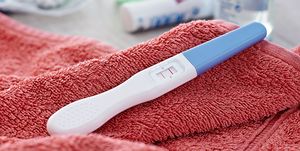If you’ve been getting your annual well visits at the gyno (as you should be), you’re likely well familiar with Pap smears, which look for abnormal changes on your cervix and can indicate a human papillomavirus (HPV) infection, pre-cancerous cells, or even cervical cancer.
If you’re pregnant, you may be wondering if it’s safe to get Pap smears during pregnancy as part of your OB visits, especially if you’ve come across conflicting information online. Here are all the facts on Paps during pregnancy.
Is a Pap smear a routine procedure during pregnancy?
Current American College of Obstetricians and Gynecologist guidelines recommend women ages between the ages of 21 and 29 have a Pap smear every three years. Women ages 30 to 65 should have a Pap smear and HPV test every five years, or a Pap test alone every three years.
If you’ve previously had an abnormal result from a cervical screening test, or haven’t had a screening test in the last three to five years, you may need to have a screening test while pregnant, says Jodie Horton, MD, an ob-gyn in Oakton, Virginia, and chief wellness advisor for Love Wellness. This will usually happen at your first prenatal visit, along with other prenatal labs and blood tests. However, it is otherwise not a standard practice to get one during the first trimester. “Your doctor will follow the same cervical screening test guidelines regardless if you are pregnant or not,” she says.
If needed, the Pap test will normally be done early in pregnancy because it is a way to help detect any abnormal cells and if they are found early on, they can be treated, adds Jessica Shepherd, MD, a minimally invasive gynecologist in Dallas.
“Pap tests don’t cause any harm to a fetus and are a normal part of the gynecological visits for pregnant women,” she says.
How is a Pap smear during pregnancy done?
Whether you’re pregnant or not, a Pap test is performed when your health care provider puts a metal or plastic instrument called a speculum into your vagina, separating its walls so that they can get to your cervix. They then use a small spatula or brush (also called a sampler) to gently swab cells from your cervix, which are later sent to a lab to be tested. If you’re over 30, your doctor will also sample cells to test for the most common high-risk types of HPV that are responsible for abnormal cell changes and cervical cancer.


“If [you’re found to] have severely abnormal cells of the cervix [beforehand], it is always best to discuss the treatment plan before getting pregnant,” says Dr. Horton. “Some treatments of high-grade abnormalities of the cervix involve removal of part of the cervix but this is generally not recommended during pregnancy unless absolutely necessary.”
The Pap test is not performed any differently in pregnancy, as it is not invasive and only swabs cells from the outside part of the cervix, Dr. Shepherd says. “There may be some extra spotting or light bleeding due to the cervix being a little bit inflamed and fragile in pregnancy, but this is not dangerous,” she says.
Wait, what happens if your Pap smear comes back as abnormal during pregnancy?
“If the results of your Pap smear come back abnormal, don’t panic—this does not mean that you have cancer,” says Dr. Horton.
If a pregnant woman has a Pap smear that comes back with abnormal results, the health care provider will recommend further testing options that are safe to perform during pregnancy, says Dr. Shepherd. These options may include repeating the Pap in a year, or getting another test called a colposcopy, which uses a small magnifying instrument to look at the cervix after applying a vinegar solution to highlight any abnormal areas.
Colposcopies are commonly done with a biopsy to remove a small tissue sample at the same time. While it’s safe to perform a biopsy during pregnancy, your doctor will likely opt to wait until after you deliver, instead monitoring with frequent colposcopies throughout the rest of your pregnancy. Your doctor may opt to do an initial biopsy during your second trimester if a colposcopy showed any abnormalities, says Dr. Horton.
“Cervical cancer is slow-growing and generally will not progress during the pregnancy or affect the pregnancy,” says Dr. Horton. “Based on a biopsy or evaluation during the colposcopy, a follow-up Pap and colposcopy are typically done six weeks or more after giving birth. If cervical cancer is diagnosed at the time of colposcopy, the doctor will discuss treatment options.”
Are there any dangers of getting a Pap smear during pregnancy?
You may have come across rampant rumors that Pap smears during pregnancy can cause miscarriage or lead to other complications. Experts want you to know that not only is there *no* truth there, but there are also no risks associated with getting a Pap smear during pregnancy. In fact, there are risks if you don’t catch an infection or health issue that a Pap may help detect.
Fifteen to 20 percent of all pregnancies end in miscarriage, and 80 percent of those miscarriages occur in the first trimester, notes Dr. Horton.“While you may have some light spotting after a Pap smear because of the increased blood flow to the uterus and cervix to support a growing baby, this is not always an indication that a miscarriage is going to happen. If a miscarriage happens, this is just a coincidence and not a consequence of the Pap smear.”
The bottom line? If you need a Pap smear during pregnancy, a Pap test is completely safe during pregnancy and will not hurt your baby. “The most important message is that this test saves lives and should be looked at as very crucial to both the health of a mother and her baby,” says Dr. Shepherd.
Source: Read Full Article

